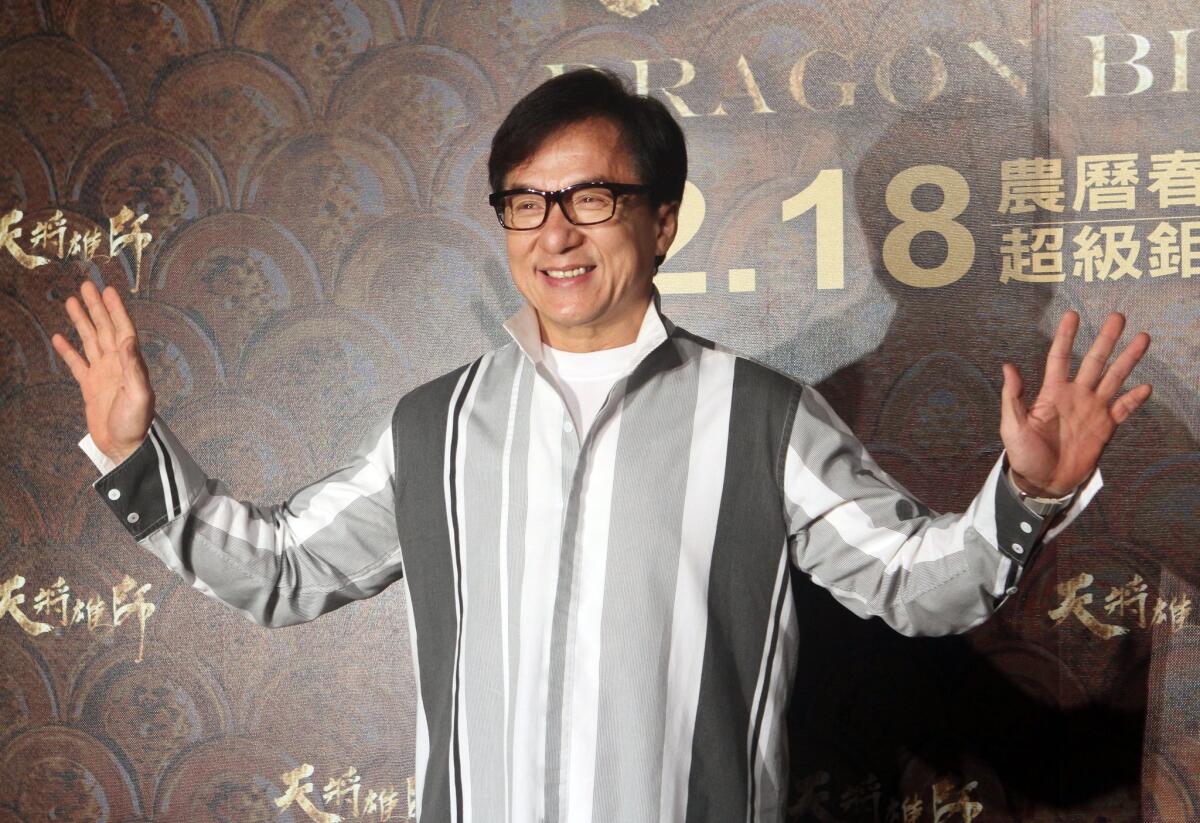Duang! Jackie Chan meme takes off on Chinese Internet

- Share via
Reporting from Beijing — Thank Jackie Chan. The Internet has a new meme, and it rhymes (sort of) with “wrong.” It’s “duang!”
What is duang, you ask? Well, the definition is a work in progress, but that hasn’t stopped the Chinese Internet from going crazy for it.
While Americans were online fussing over whether a certain dress was blue and black or white and gold, in China, Internet users were suddenly bombarded – duang! -- by a fresh onomatopoeia.
Or perhaps it’s not so fresh. Back in 2004, Chan shot a TV commercial for Bawang shampoo, during which the actor used the made-up word “duang” to describe the particular effects of this hair care product. “Make you hair go ‘duaaang!’ Very black! Very shiny! Very soft!”
Recently, a parody video making fun of the commercial hit the interwebs, set to a popular song. “Duang” was singled out for particular attention and remixed repetitively, as the parody had Chan admitting (in doctored subtitles) that he really had no hair and the whole commercial was fake.
“Duang” has no official definition, and is rather ambiguous and abstract. Perhaps that explains its appeal.
As a purely invented word, there is great freedom to play with duang: Some users of China’s micro-blog platform Weibo are using it to describe the positive enhancements of special effects. For example, “I look so duang after Photoshop.”
Others are applying it to a situation where something suddenly happens: “Duang, the battery has run out without a warning!”
It can also, apparently, be employed as an adverb to express the extent to which something is good or bad: “Today is so duang sunny,” or “I’m so duang sad.”
After “duang” became the most-searched word on the popular Chinese social media platform Sina Weibo last week, Chan himself posted the word on his Weibo account; the post attracted more than 45,000 comments and 64,000 reposts.
On Sina Weibo, the topic of “duang” has been read 180 million times and discussed among 525,000 users. The word has created such a storm that it even has its own page on Baidu.com’s Wikipedia-like Baike.
The sudden surge of “duang” comes as Chan is enjoying a bit of a comeback after a difficult stretch. His latest film, “Dragon Blade,” a historical action epic featuring Adrien Brody and John Cusack, performed strongly over the Chinese New Year holiday in February.
And he’s in the spotlight this week: Chan is a delegate to the Chinese People’s Political Consultative Conference, an advisory body to China’s rubber-stamp parliament. The CPPCC opened its annual session in Beijing this week.
But just a few months ago, Chan’s son, Jaycee, was imprisoned on drug charges in China – which was awkward for Chan, who has served as a government “anti-drug” ambassador.
Whether duang is a celebration of Chan or a mockery of him is hard to say. But he’s been pummeled publicly before, particularly for endorsing products that ended up in scandals, including a poor-quality air conditioner and an auto-repair school that violated recruitment regulations. And in 2010, the manufacturer of Bawang shampoo was accused of using dioxane, a cancer-causing chemical, in its hair products.
On Tuesday, Jackie Chan appeared at the opening of the CPPCC meeting in Beijing. When reporters asked him to explain the meaning of “duang,” he explained simply: “it’s fun.”
“Duang” does not have a dedicated Chinese character, and is often written with English letters. But Chinese netizens have now – duang! – created their own Chinese character for it.
It uses the two characters from Chan’s Chinese name, which roughly translates as “Accomplished Dragon,” stacking them into one unified character. Duang!
Nicole Liu in the Times’ Beijing bureau contributed to this report.










